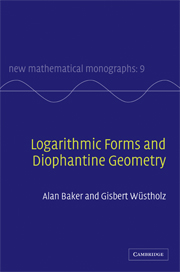4 - Commutative algebraic groups
Published online by Cambridge University Press: 10 November 2009
Summary
Introduction
This chapter will be devoted to the preliminary results on commutative group varieties needed for the proof of the fundamental multiplicity estimates that we shall give in Chapter 5. The estimates are crucial to the recent refined results concerning linear forms in logarithms; essentially, they replace the generalised van der Monde determinants and the Kummer descent as used in the original work. The theorems in Chapter 5 will furnish all that is needed for the treatment of logarithmic forms in both the homogeneous and inhomogeneous cases as well as dependence relations of the type discussed in Section 7.1. The approach given here employs techniques from commutative algebra and algebraic geometry and extends to much more general situations, in particular to arbitrary algebraic groups. The basic tools used in the derivation of the multiplicity estimates are the theory of Hilbert functions and the intersection theory of varieties (see Wüstholz [263]).
Before going into details we give a short historical account of the use of these methods in transcendence. They were in fact introduced by Nesterenko [186] in 1977 in connection with his studies on E-functions and then further developed by Brownawell and Masser [61]. A variant of this technique combining commutative algebra with certain arithmetical considerations was given by Wüstholz [258] in 1980. Subsequently, between 1981 and 1985, Masser and Wüstholz [164, 165, 166] proved a zero estimate on group varieties appertaining to a single differential operator.
- Type
- Chapter
- Information
- Logarithmic Forms and Diophantine Geometry , pp. 70 - 88Publisher: Cambridge University PressPrint publication year: 2008



